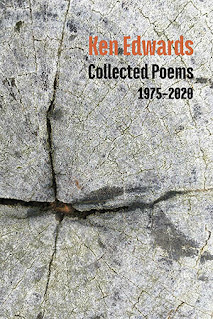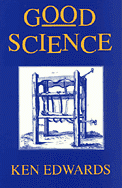Bibliography
Here's a list of everything I've got available, in reverse chronological order (most recent first, that is). There were a huge number of chapbooks, pamphlets, and occasional books with spines, between 1975 and around the early 2000s, containing my verse work, but virtually all are now out of print. And everything from that era that I want to keep is in my Collected Poems.

Grech
(Grand Iota, 2025)
The texts written during Covid and sampled in Bulverhythe Variations (below) were revised and expanded and gradually became this novel, a study of isolation. An elderly homeless man living on the edge of a beach discourses at length on philosophy, poetry and science (hinting he may have once been a private detective). But his history remains mysterious, and he goes by a different name depending on whom he is talking to. He seems obsessed by someone in his past named Grech whom he appears to blame for the chain of events leading to his current misfortune, but the stories don’t quite add up....

Bulverhythe Variations (with Elaine Edwards)(Silverhill Press, 2022)
 |
Grech
(Grand Iota, 2025)
The texts written during Covid and sampled in Bulverhythe Variations (below) were revised and expanded and gradually became this novel, a study of isolation. An elderly homeless man living on the edge of a beach discourses at length on philosophy, poetry and science (hinting he may have once been a private detective). But his history remains mysterious, and he goes by a different name depending on whom he is talking to. He seems obsessed by someone in his past named Grech whom he appears to blame for the chain of events leading to his current misfortune, but the stories don’t quite add up....

Bulverhythe Variations (with Elaine Edwards)(Silverhill Press, 2022)
A beautiful 66pp photo-book from photography publisher Silverhill Press, with 32 images by Elaine Edwards taken in the early morning on an abandoned coastline during the Covid period, accompanied by three texts by me, meditating on isolation and the breaking of symmetry. Elaine also produced an album of a series of keyboard compositions to go with these, on three of which I read my texts. Her music is magical.
 |
(Grand Iota, 2022)
This is one of the novels I'm most proud of. It has barely been reviewed, and at least one of the (favourable!) reviews that did appear seems to have misunderstood it. One perceptive reader, however, said it was one of his two favourite post-Brexit novels, the other being M John Harrison's The Sunken Land Begins to Rise Again, which chuffed me greatly. For more on this, see my blog post "How Secret Orbit came to be written", elsewhere on this site.
Collected Poems 1975-2020
(Shearsman Books, 2021)
Everything except the prose (though there's some of that here too). A big book (532pp), containing in full all these collections: Erik Satie loved children (1975), Dover (1977), Lorca: an elegiac fragment (1978), Tilth (1980), Drumming & poems (1982), Intensive Care (1986), A4 Portrait (1984), A4 Landscape (1988), Lyrical Ballets (1990), Good Science (1992), 3,600 Weekends (1993), Glissando Curve (1995-7, previously unpublished), The Glory Boxes (2000-2, previously unpublished), eight + six (2003), Songbook (2009)
"If you haven’t read Ken Edwards’ poetry yet then you are in for a lot of treats and they’re all in this book." – from a review by Peter Hughes, Golden Handcuffs
Review by Rupert Loydell, International Times
My third novel uses crime fiction tropes, though the mystery
seems incapable of any single solution and it's not clear there even was a crime. An old and vulnerable woman has
gone missing, and a private detective, Phidias Peralta, an illegal
resident in a business park near the run-down port of Deadmans Beach,
has been hired by her nephew to find her. His assistant, Lucy, is more
concerned with her seven-year-old son who is failing at school, but she
is drawn inexorably into the investigation. I like it because it's perhaps the richest in content of my novels, drawing on the geography of the south coast of England where I now live.
Review by Guy Russell in Tears in the Fence
Wild Metrics
(Grand Iota, 2019)
a book with no name
(Shearsman Books, 2016)
It is not a book of poems."The impact is similar to some serial music, cumulative and entrancing. The reader is drawn into the artifice and drama of speech acts."(from a review by David Caddy, Tears in the Fence)
Country Life
(Unthank Books, 2015)
Jobless, young Dennis Chaikowsky is house-sitting for his
parents in the back end of nowhere, near a nuclear power station
on the coast. His attempts at musical composition are stymied
by his complicated relationship with his Neo-Marxist poet friend,
city-dweller Tarquin, his sexual obsession with Alison, a.k.a
Wanda, who works in the power station by day and is a singer
by night, and his fear and awe of her rock musician husband
Severin. It's an unsustainable comedy, but the world outside,
natural and unnatural, doesn't care. Unthank Books did a lovely job of publishing this, my second novel.There are reviews here and here. And also here.
Down With Beauty
(Reality Street, 2013)
In a series of linked dialogues, dramatic monologues and short fictions, the themes of exile, the aftermath of war, paranoia, improvised music and nothingness are explored. The collection is completed with the full text of Nostalgia for Unknown Cities, previously published separately.
Bardo: forty-nine prose pieces over seven days
(Knives Forks and Spoons Press, 2011)
A contemporary rewrite of the Tibetan Book of the Dead (the Bardo Thodol), set in the port and old town of Hastings. The illusory gods and demons haunting the original have been translated into modern equivalents, while the original colour scheme of the seven days has been retained. With seven colour plates (photographs by me).
Songbook
(Shearsman Books, 2009)
Spanning two decades of work, this is a book of songs that have never been and never will be sung; anti-lyric and narrative poems for which a musical equivalent has been constructed; and text written specifically for musical purposes (including the text for a piece composed by the pianist John Tilbury). Also included are the scores of three settings by Elaine Edwards of three poems from eight + six.
No Public Language: Selected Poems 1975-1995
(Shearsman Books, 2006)
Now superseded by Collected Poems 1975-2020 (see above).
Futures
(Reality Street, 1998)
First published in 1998, this novel was reissued in 2010 under a new cover after briefly going out of print. The narrative traces the paths taken on her bicycle by the protagonist, Eye, across and out of an unnamed city in the wake of an event she can’t remember. Her quest is to face her terror and retrieve the fragments of her life, which lie in the future that never quite arrives, until it does.
After years of trying, it was my first properly sustained narrative beyond short-story length, and I still like it.
Good Science
(Roof Books, 1992)
Poems 1983-1991. A (prose) preface and three sequences. New York based Roof Books, run by James Sherry and associated with many of the Language writers, published this one, and it's pretty much the only original poetry collection of mine still in print. (But you get the full text in Collected Poems, above.)Online books and publications
The Glory Boxes in onedit issue 7
Chaconne (at www.shearsman.com)
Online audio & video
Archive of the Now recordings, 2005
Reading from "Bardo" and "There's something in there..." from Songbook at The Other Room, Manchester, on 6 April 2011
Text for Mark French/Elaine Edwards' film No Fixed Edge, 2018
A live reading of "Fall" from a book with no name, backed by Necessary Animals with Anthony Moore, 2023
Poetry, fiction, translations, criticism in magazines
These include: And, Angelaki, Bananas, Big Allis, Boundary 2, Cannibal Spices, Critical Quarterly, Exact Change Yearbook, Five Fingers Review, Fragmente, The Gig, Golden Handcuffs Review, Jacket, Kiosk, L=A=N=G=U=A=G=E, Litmus Magazine, The Many Review, Molly Bloom, New American Writing, Ninth Decade, Oasis, Object Permanence, onedit, Pages, PN Review, Poetry Salzburg Review, Sulfur, Sunfish, Talisman, La Traductière, Transatlantic Review, Veer Off, VLAK, West Coast LinePoetry, fiction and essays in anthologies
New Stories 2 (Arts Council, 1977)Angels of Fire (Chatto & Windus, 1986)
The New British Poetry (Paladin Books, 1988)
Floating Capital: new poets from London (Potes & Poets Press, 1991)
Poets on Writing (Macmillan, 1992)
Other: British & Irish Poetry since 1970 (Wesleyan University Press, 1999)
Binary Myths 2: correspondences with poet/editors (Stride, 1999)
News for the Ear: a homage to Roy Fisher (Stride, 2000)
Quarante et un poètes de la Grande-Bretagne (ed. Patrick Williamson, Écrits des Forges, 2003)
The Canting Academy (ISPress, 2008)
The Reality Street Book of Sonnets (Reality Street, 2008)
As editor
Co-editor/publisher of Grand IotaEditor/publisher of Reality Street
Editor of Reality Studios magazine (1978-88)
Co-editor of CLASP: late modernist poetry in London in the 1970s (Shearsman, 2016)
Co-editor of The New British Poetry (Paladin Books, 1988)
Co-editor of Alembic (1973–79)
Etc...
My essay "The Two Poetries" is available as a download at the Great Works site.An extended response by JH Prynne to Futures is available at Golden Handcuffs Review.
A response by Brian Marley to Nostalgia for Unknown Cities is at Golden Handcuffs Review.
An interview was published by Signals magazine, another more recently at Dr Fulminare and one mainly about songwriting at Hastings Online Times.
And 12 or 20 questions (mainly on Reality Street) were answered on Rob McLennan's blog in February 2011.
An article on small press publishing is at the Electronic Poetry Centre - since updated for Mimeo Mimeo magazine.














Comments